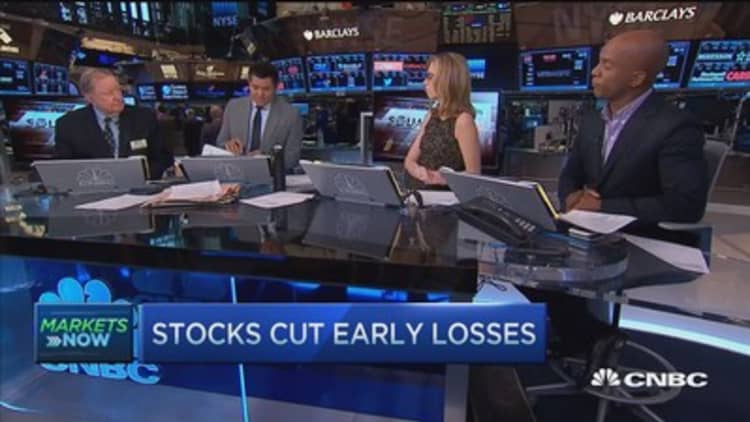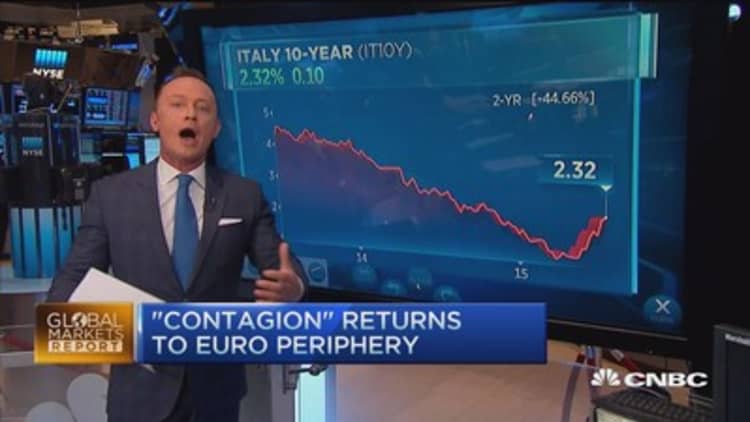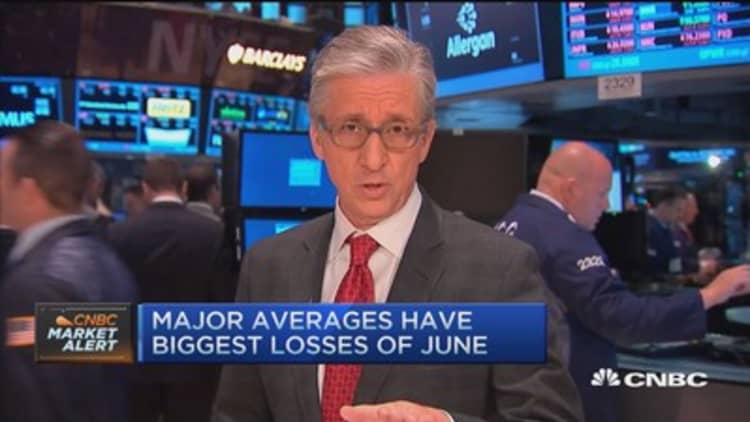


U.S. stocks closed lower on Monday as investors remained anxious over stalled Greece debt talks and the upcoming two-day Federal Reserve meeting. (Tweet This)
"Right now the key driver in the U.S. and international markets seems the breakdown in the Greece negotiations," said Art Hogan, chief market strategist at Wunderlich Securities.
The major averages pared losses after testing lows hit last week. The Nasdaq Composite closed 0.4 percent lower after falling more than 1 percent in the open as the iShares Nasdaq Biotechnology ETF (IBB) declined and Apple edged lower. Information technology was among the greatest decliners in the S&P 500 as nine sectors declined.
The Dow Jones industrial average fell back into the red for 2015. The index closed about 110 points lower after earlier falling nearly 200 points, with United Technologies leading almost all blue chips lower.
United Technologies closed 2.5 percent lower after news the firm will either spin off or sell its Sikorsky Aircraft division, which makes Black Hawk helicopters for the U.S. military. Earlier in the month the unit said it would and consolidate facilities on reduced demand from international military orders and energy companies, a primary non-defense customer.
The Dow transports also traded lower, off half a percent as all airlines except JetBlue declined.
Major averages 5-day performance
"We're seeing some selling ahead of the Fed, and we're selling on lack of progress in Greece," said Adam Sarhan, CEO of Sarhan Capital.
"The global economy remains weak. If the Greece domino falls, that could adversely affect (or) derail the global recovery," he said. "With rates at zero and Greece in the euro the economy's barely growing."
The German DAX closed 1.89 percent lower, while the Greek ATHEX Composite briefly fell more than 5 percent as regional bank stocks sold off. Greek 10-year bond yields gained about 4 percent after earlier spiking more than 7 percent.
Athens and its creditors failed to come to a deal over the weekend because Athens did not accept demands for deeper reforms of pensions, value-added tax (VAT) and of its administration, labor markets and industry, Reuters said. The European Commission said on Monday that Greece's creditors have made substantial concessions, and Germany's EU commissioner said the time had come to prepare for a "state of emergency".
Read MoreGreece on 'brink of disaster,' calls emergency meeting
European Central Bank President Mario Draghi also said on Monday that the ECB would continue approving emergency funding for Greek banks as long as they have enough cash and collateral to operate. He added "the ball lies squarely in the camp of the Greek government to take the necessary steps."
Last week, the International Monetary Fund said "major differences" remained and its team left Brussels, where negotiations were held.
"There's just a lot of uncertainty we just don't know how markets would play out were Greece to default," said Ben Garber, capital markets economist at Moody's Analytics. "It's best to trade cautiously."
Read MoreThese investors like Greece debt talks breakdown
He said the bond market indicated some flight to safety on Greece and disappointing U.S. industrial production data.
Treasury yields recovered slightly in late morning trade, with the U.S. 10-year Treasury yield near 2.36 percent after hitting a low of 2.31 percent and the 2-year yield near 0.70 percent. The German 10-year bund yield gained to 0.82 percent after earlier dipping below 0.80 percent.
Outside of developments in the Greece debt talks, the key event for the week is the Federal Open Market Committee's two-day meeting, which begins on Tuesday and concludes Wednesday afternoon with a statement and press conference. Investors will scrutinize the release for indications on the timing of a short-term interest rate hike, for which consensus is September.
Read MoreThis would be scary enough to give Fed pause
Expectations for a September liftoff most likely mean Fed chair Janet "Yellen's press conference will be more hawkish than usual," said Peter Cardillo, chief market economist at Rockwell Global Capital. "That's going to weigh."
He said with fears of higher interest rates, uncertainty over Greece and quarterly options expiration on Friday, stocks should be volatile this week. Cardillo continues to watch 2,070 on the S&P 500 for support.
Major U.S. Indexes
Economic reports on Monday were mixed. However, the second-tier data followed recent improvement in retail sales and the labor market.
Empire manufacturing data showed the weakest level in more than two years as new orders fell, Reuters said. The New York Fed's Empire State general business conditions index fell from 3.09 in May to negative 1.98 in June, hitting its lowest level since January 2013.
unexpectedly fell, dropping 0.2 percent in May.
The National Association of Home Builders (NAHB) housing market index rose more than expected, gaining 5 points in June to the highest since last September.
Read MoreEarly movers: CVS, MU, LOW, BABA, TWTR, RYL & more
No major earnings reports were expected.
Target closed up 1.2 percent after drugstore operator CVS Health said it will acquire the retailer's U.S. pharmacy and clinics businesses in a $1.9 billion deal. CVS ended the day mildly higher, up 0.4 percent.
Cigna closed up 11.7 percent at a record after spiking more than 17 percent on news the health insurance provider rebuffed a takeover approach by larger insurer Anthem, Dow Jones reported. Anthem closed up 2.3 percent.
AIG gained more than 1 percent after a U.S. judge on Monday ruled the and other shareholders of the company any damages over the company's 2008 bailout.
The Dow Jones Industrial Average closed down 107.54 points, or 0.60 percent, at 17,791.30, with United Technologies leading decliners with UnitedHealth leading three advancers.
The closed down 9.68 points, or 0.46 percent, at 2,084.43, with industrials leading all sectors except health care lower.
The Nasdaq closed down 21.13 points, or 0.42 percent, at 5,029.97.
The CBOE Volatility Index (VIX), widely considered the best gauge of fear in the market, traded near 15.
About two stocks declined for every advancer on the New York Stock Exchange, with an exchange volume of 734 million and a composite volume of nearly 3 billion in the close.
The U.S. dollar reversed to trade lower against major world currencies, with the euro advancing to $1.1286.
Crude oil futures settled down 44 cents at $59.52 a barrel on the New York Mercantile Exchange. Gold futures ended up $6.60 at $1,185.80.
On tap this week:
Monday
4 p.m.: TIC data
Tuesday
FOMC begins two-day meeting
8:30 a.m.: Housing starts
Wednesday
2 p.m.: FOMC statement
2:30 p.m.: Fed Chair Janet Yellen press briefing
Thursday
8:30 a.m.: Initial claims
8:30 a.m.: CPI
8:30 a.m.: Current account Q1
10 a.m.: Philadelphia Fed survey
Friday
11:40 a.m.: San Francisco Fed President John Williams on policy
12:45 p.m.: Cleveland Fed President Loretta Mester on community development and the Fed
More From CNBC.com:


